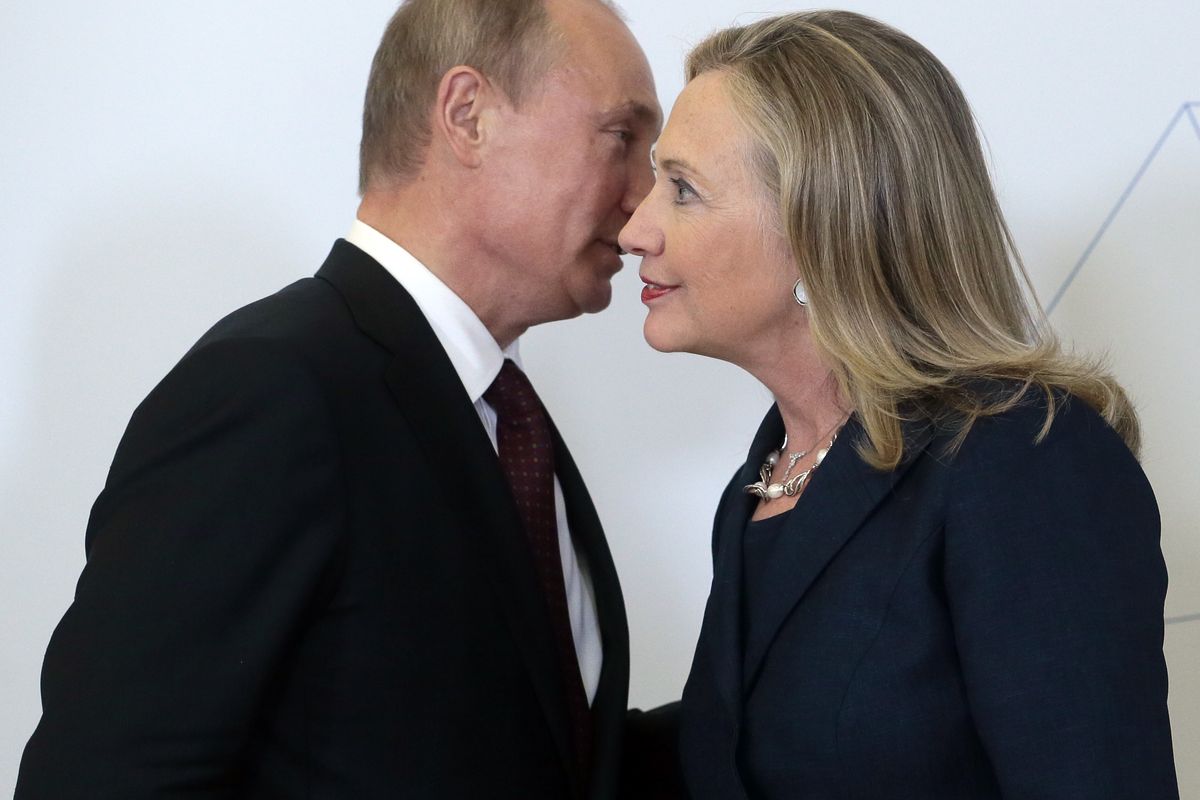Russia rebuffs Clinton on Syria, Iran penalties

VLADIVOSTOK, Russia (AP) — Russia on Saturday soundly rejected U.S. calls for increased pressure on Syrian President Bashar Assad to relinquish power. U.S. Secretary of State Hillary Rodham Clinton tried to prod Moscow into supporting U.N. action to end the crisis in Syria and she expressed hope that Congress would repeal Cold War-era trade restrictions on Russia.
Russian Foreign Minister Sergey Lavrov, after meeting Clinton on the sidelines of a meeting of Pacific Rim leaders, told reporters that Moscow is opposed to U.S.-backed penalties against the Assad government, in addition to new ones against Iran over its nuclear program, because they harm Russian commercial interests.
“Our American partners have a prevailing tendency to threaten and increase pressure, adopt ever more sanctions against Syria and against Iran,” Lavrov said. “Russia is fundamentally against this, since for resolving problems you have to engage the countries you are having issues with and not isolate them.”
“Unilateral U.S. sanctions against Syria and Iran increasingly take on an extraterritorial character, directly affecting the interests of Russian business, in particular banks,” he said. “We clearly stated that this was unacceptable, and they listened to us. What the result will be, I don’t know.”
Clinton, who also met with Russian President Vladimir Putin during the annual Asia-Pacific Economic Cooperation forum summit in Vladivostok, had urged Moscow to reconsider its opposition to the penalties, particularly against Syria in order to convince Assad that he should agree to a political transition, according to a senior U.S. official.
Clinton told her Russian counterpart that the Security Council needed to do more to send “a strong message” to Assad, given the escalating level of violence in Syria, said the official, who was present during the meeting. Clinton made clear to Lavrov that the Security Council risks “abrogating its responsibility” if it fails to act.
The official spoke on condition of anonymity because the conversation was private.
Russia and China have blocked three Security Council resolutions that would have punished Syria if the Assad government did not accept a negotiated political transition. Clinton said in Beijing this past week that the U.S. was “disappointed” by the vetoes.
She had earlier called the actions “appalling” and said they put Russia and China on the “wrong side of history.” That assertion was rejected by Chinese Foreign Minister Yang Jiechi at a news conference with Clinton on Wednesday, when Yang said history would prove China’s position to be correct.
On Saturday, Lavrov said Russia’s opposition to penalizing Syria was based on the premise that “they don’t achieve anything.”
The question of sanctions against Syria and Iran will be a main topic of conversation among officials later this month at the U.N. General Assembly, and the U.S. official said Clinton had discussed both with Putin during dinner in Vladivostok.
Clinton, who’s in Russia’s Far East representing President Barack Obama at the APEC summit, also discussed with Putin topics including wildlife conservation, the upcoming winter Olympics in Sochi, Russia, and bilateral trade and investment, the official said.
Despite Russia’s refusal to join the U.S. and its allies in seeking more pressure against Syria and Iran, Clinton told business leaders at the APEC meeting that the Obama administration wants Congress to repeal a 1974 law that denies Russia normal trade relations with the U.S because of Soviet-era laws restricting the emigration of Jews.
Now that Russia has joined the World Trade Organization, Clinton said the Obama administration is “working closely” with lawmakers on that issue and hopes that “Congress will pass on this important piece of legislation this month.”
At the same time, Washington is looking for Russia to play a greater role in the Asia-Pacific region as the U.S. tries to quell growing maritime tensions.
Territorial disputes, including between U.S. allies Japan and South Korea, sparked by nationalist rhetoric have fueled fears of conflict.
Clinton has spent the last week in the region urging peaceful resolutions to competing territorial claims between China and its smaller neighbors in the South China Sea. The U.S. wants to see the Association of Southeast Asian Nations and China establish quickly a code of conduct for the area to be followed by a mechanism to resolve the conflicts peacefully without intimidation, coercion or clashes.
She began Saturday by signing an agreement with Lavrov that will enhance U.S.-Russia scientific cooperation in the Antarctic, as well as link national parks on either side of the Bering Strait.